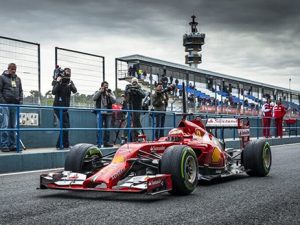Table of Contents
- The Early Years: 1950s
- Innovations and Changes: 1960s-1970s
- The Turbo Era: 1980s
- Modern F1: 1990s-Present
The Early Years: 1950s
The inaugural Formula 1 World Championship took place in 1950. The post-war era brought a surge of interest in motorsport, leading to the formation of modern F1. Nino Farina won the first ever World Championship in his Alfa Romeo. The races were dominated by Italian teams, with Alfa Romeo, Ferrari, and Maserati leading the charge. The introduction of these races heralded a new era of motor sports, drawing massive crowds and increasing international interest.
Key Milestones of the 1950s
- 1950: Introduction of the Formula 1 World Championship
- 1951: Juan Manuel Fangio enters the scene, winning multiple championships
- 1958: First Constructors’ Championship awarded
Innovations and Changes: 1960s-1970s

As technology advanced, so did Formula 1. During the 1960s and 1970s, cars became faster and safer. This period saw the introduction of innovations such as aerodynamic wings and sponsorship liveries. It was also marked by the rivalry between drivers like Graham Hill and Jackie Stewart. The mid-70s introduced turbocharged engines, setting the stage for future advancements.
Technical Innovations of the 1960s-1970s
| Year | Innovation |
|---|---|
| 1962 | First Monocoque Chassis |
| 1968 | Sponsor Ads on Cars |
| 1977 | First Turbocharged Engine in a Formula 1 car |
The Turbo Era: 1980s
The 1980s were defined by powerful turbocharged engines. This era brought about intense competition with drivers like Ayrton Senna, Alain Prost, and Nelson Piquet. The cars were faster than ever, and safety became a significant concern following several tragic accidents. The dominance of McLaren and Williams teams illustrated the importance of technological superiority in motorsport success.
Champions of the Turbo Era
- 1981: Nelson Piquet
- 1985: Alain Prost
- 1988: Ayrton Senna
Modern F1: 1990s-Present
From the 1990s to the present, F1 has seen significant regulations changes to enhance safety, maintain competitive balance, and promote sustainability. The rise of teams like Ferrari, Mercedes, and Red Bull Racing has created new legends in the sport. This era is marked by global expansion, with races held across the world, introducing F1 to millions of new fans.
Modern Drivers and Teams

Key figures in the modern era include Michael Schumacher, with his dominance in the early 2000s, and Lewis Hamilton, a contemporary legend. The sport continues to evolve with hybrid engine technology and an increasing focus on environmental sustainability.
How Long Do Shock Absorbers Really Last? Mileage vs Reality
Shock absorbers are one of the unsung heroes of your vehicle’s suspension system. They play a vital role in ride comfort, handling stability, and overall safety. But a question many drivers ask is: How long do shock absorbers really last? While manufacturers often provide general mileage estimates, real-world conditions can…
Shock Absorbers for Hybrid Vehicles: Unique Requirements
Hybrid vehicles have surged in popularity as drivers seek better fuel economy without sacrificing performance. While many components in hybrid cars are shared with traditional internal combustion engine (ICE) vehicles, suspension systems and shock absorbers face unique demands. Understanding these specific requirements is crucial for optimal ride quality, handling, and…
Why One Failed Shock Absorber Can Damage the Others
Shock absorbers are vital components of a vehicle’s suspension system. They control the rapid up-and-down movement of the wheels, dampening vibrations and maintaining tire contact with the road. When all shock absorbers work as designed, the ride is comfortable, predictable, and safe. However, when even one shock absorber fails, the…
Shock Absorbers for SUVs vs Sedans: Key Design Differences
Shock absorbers are a vital part of any vehicle’s suspension system, but they aren’t one-size-fits-all. Vehicles such as SUVs (Sport Utility Vehicles) and sedans have distinct design goals — SUVs prioritize load-carrying and off-road capability, while sedans emphasize comfort and handling on paved roads. As a result, the shock absorbers…
Shock Absorber Heat Fade: Causes, Symptoms, and Solutions
Shock absorbers play a critical role in vehicle safety, comfort, and handling. They control suspension movement, keep tires in contact with the road, and stabilize the vehicle during braking, acceleration, and cornering. However, under certain conditions, shock absorbers can lose effectiveness due to a phenomenon known as heat fade. Understanding…
Why Replacing Shocks in Pairs (or Sets) Matters
Shock absorbers play a critical role in your vehicle’s suspension system, controlling body movement, maintaining tire contact with the road, and ensuring comfort and safety. When one shock absorber fails or wears out, many drivers are tempted to replace just that single unit to save money. However, this approach often…
How Shock Absorbers Age Even When You Don’t Drive Much
Shock absorbers are vital components of your vehicle’s suspension system. They control how your car responds to bumps, dips, and road imperfections, providing stability, comfort, and safety. Many drivers assume that shock absorbers only wear out due to mileage — the more you drive, the more they age. However, this…
Why New Shock Absorbers Can Feel Too Stiff at First
Upgrading your suspension with new shock absorbers can be an exciting improvement — especially if your old shocks were worn out and your ride quality suffered. Yet many drivers are surprised when their vehicle feels too stiff immediately after installing new shock absorbers. Rather than a smooth, comfortable ride, the…
How Active Suspension Systems Are Changing the Role of Shock Absorbers
Automotive suspension technology has evolved rapidly in recent years, and one of the most transformative innovations is active suspension. Unlike traditional passive systems, which rely solely on springs and shock absorbers to respond to road conditions, active suspension uses sensors, electronic control units, and actuators to adjust damping in real…
Signs Your Shock Absorber Bushings Need Replacement — And Why It Matters
Shock absorbers play a critical role in keeping your vehicle stable, smooth, and safe on the road. But the shock absorber itself isn’t the only component that matters — its bushings are equally important. These small rubber or polyurethane mounts isolate vibrations, reduce noise, and ensure proper alignment between the…